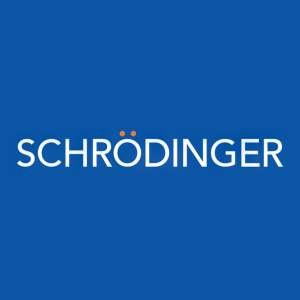MD Anderson and Schrödinger Announce Strategic Research Collaboration to Accelerate Development of WEE1 Program
Schrödinger, Inc. (Nasdaq: SDGR) has announced a strategic two-year collaboration with The University of Texas MD Anderson Cancer Center to advance its WEE1 inhibitor program. The partnership aims to optimize therapeutic development through biomarker-driven patient stratification and clinical study prioritization. Schrödinger's WEE1 inhibitors showed promising preclinical results, and the collaboration will investigate their potential as single agents and in combination therapies for specific cancer types. Schrödinger retains sole responsibility for development and commercialization of these compounds.
- Strategic collaboration with MD Anderson accelerates WEE1 inhibitor development.
- Preclinical results show strong pharmacodynamic responses and anti-tumor activity.
- Partnership focuses on molecular biomarker-driven patient stratification.
- None.
Insights
Analyzing...
Translational research will focus on advancing therapeutic strategies for Schrödinger’s selective WEE1 inhibitors to optimally benefit patients
The collaboration brings together the translational research and drug development expertise of MD Anderson’s Therapeutics Discovery division with Schrödinger’s expertise and drug development program for WEE1 inhibitors. The goal of the collaboration is to accelerate and optimize the clinical development path for Schrödinger’s WEE1 program through molecular biomarker-driven tumor type prioritization and patient stratification and to validate biomarkers to predict response or resistance to a WEE1 inhibitor. The joint team will seek to prioritize clinical studies of a WEE1 inhibitor as a single agent in selected cancer indications and in rational combinations for defined clinical subpopulations.
“We are excited to work with MD Anderson’s researchers to speed the development of our WEE1 program and potentially advance a new therapeutic option for patients,” said
Under the preclinical collaboration agreement, Schrödinger will join forces with researchers in MD Anderson's
“Targeting WEE1, a critical gatekeeper of the cell cycle, is showing promise as a therapeutic strategy for treating certain cancers with select genetic alterations,” said
MD Anderson and Schrödinger will jointly pursue translational studies, and Schrödinger will provide research support funding. As part of the agreement, MD Anderson is eligible to receive certain payments based on the future development and commercialization of Schrödinger’s WEE1 inhibitor compounds. Schrödinger will have sole responsibility for the development, manufacture and commercialization of all compounds and products, and sole rights to all novel intellectual property that arises from this collaboration.
WEE1 is a gatekeeper checkpoint kinase that prevents progression through the cell cycle, allowing time for DNA repair to occur before cell division takes place. Thus, inhibition of WEE1 allows for accumulation of DNA damage, triggering DNA breakage and apoptosis in tumor cells. Schrödinger is developing tight-binding, selective WEE1 inhibitors with optimized physicochemical properties designed to be well suited for combinations with other DNA damage response therapies for the treatment of a broad range of solid tumors.
About MD Anderson
About Schrödinger
Schrödinger is transforming the way therapeutics and materials are discovered. Schrödinger has pioneered a physics-based software platform that enables discovery of high-quality, novel molecules for drug development and materials applications more rapidly and at lower cost compared to traditional methods. The software platform is used by biopharmaceutical and industrial companies, academic institutions, and government laboratories around the world. Schrödinger’s multidisciplinary drug discovery team also leverages the software platform to advance collaborative programs and its own pipeline of novel therapeutics to address unmet medical needs.
Founded in 1990, Schrödinger has over 500 employees and is engaged with customers and collaborators in more than 70 countries. To learn more, visit www.schrodinger.com and follow us on LinkedIn and Twitter.
Forward-Looking Statements
This press release contains forward-looking statements within the meaning of The Private Securities Litigation Reform Act of 1995 including, but not limited to those regarding our expectations about the speed and capacity of our computational platform, the potential of our collaboration with MD Anderson to accelerate the development of our WEE1 inhibitor program, the clinical potential and favorable properties of our WEE1 inhibitors, as well as the potential for our WEE1 inhibitors to be used as a single agent and in combination with other therapies, and the risk that we may not realize the expected benefits of the collaboration. Statements including words such as “anticipate,” “believe,” “contemplate,” “continue,” “could,” “estimate,” “expect,” “intend,” “may,” “might,” “plan,” “potential,” “predict,” “project,” “should,” “target,” “will,” “would” and statements in the future tense are forward-looking statements. These forward-looking statements reflect our current views about our plans, intentions, expectations, strategies, and prospects, which are based on the information currently available to us and on assumptions we have made. Actual results may differ materially from those described in these forward-looking statements and are subject to a variety of assumptions, uncertainties, risks and factors that are beyond our control, including our reliance upon third-party providers of cloud-based infrastructure to host our software solutions, our reliance on third party contract research organizations to assist in the discovery of development candidates, our reliance on MD Anderson to perform its obligations under the collaboration, including assisting in designing translational studies, the uncertainties inherent in drug development and commercialization, uncertainties associated with the regulatory review of clinical trials and applications for marketing approvals, the potential impact of the COVID-19 pandemic on our operations or the operations of third parties we rely on, as well as the other risks and uncertainties identified under the caption "Risk Factors" and elsewhere in our
View source version on businesswire.com: https://www.businesswire.com/news/home/20211007005230/en/
MD Anderson Media Contact
crboldt@mdanderson.org
713-792-9518
Schrödinger Contacts
jaren.madden@schrodinger.com
617-286-6264
tracy.lessor@schrodinger.com
617-519-9827
Source: Schrödinger, Inc.







